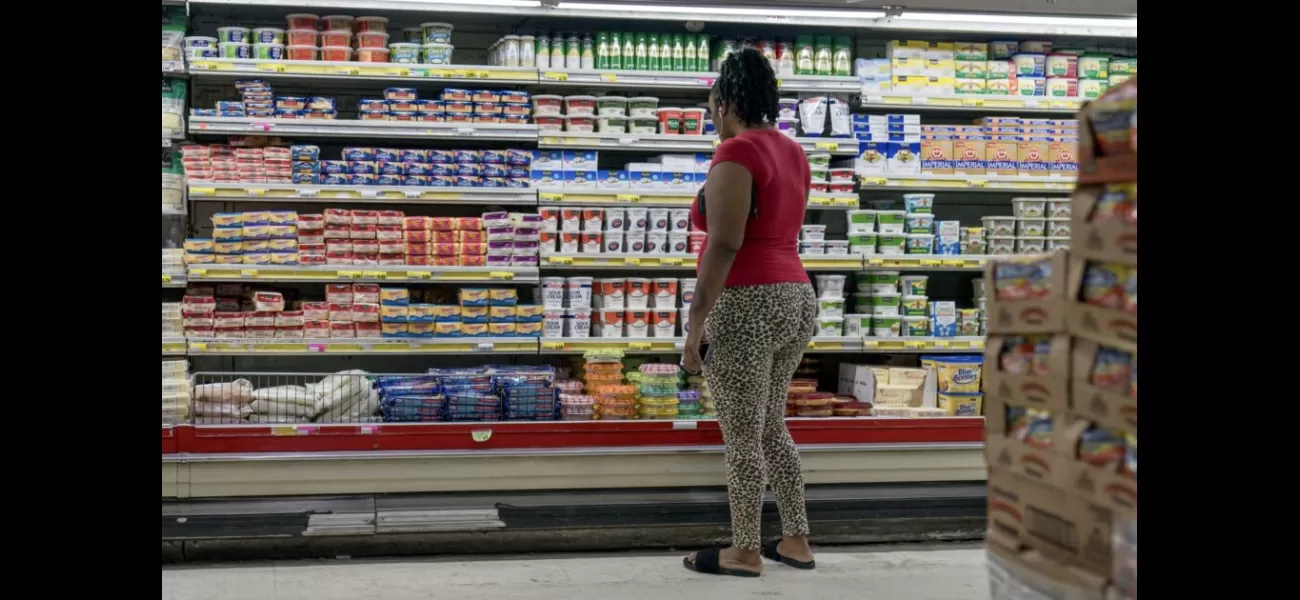Consumers are fighting back against rising prices in an effort to control inflation.
AP: Consumers fighting high prices by changing shopping habits, slowing inflation at 19% average.
February 26th 2024.

According to a report from The Associated Press, consumers are starting to push back against the rising prices that have plagued the market since before the pandemic. With an average increase of 19%, Americans have had to adjust their shopping habits to combat the high costs. This resistance is most evident in the grocery sector, where shoppers are turning to store-brand products, discount stores, and even cutting back on purchases altogether. In response, major food companies have slowed their price hikes, which has helped to decrease the overall inflation rate from a peak of 9.1% in 2022 to 3.1%.
Despite this decline, the frustration with high prices has become a central issue in President Joe Biden's reelection campaign. Critics argue that corporations have artificially inflated prices, and the White House has taken action against tactics such as "shrinkflation," where companies reduce product quantity instead of increasing prices. This consumer pushback is seen as a positive sign that inflation may continue to ease, a contrast to historical cases where persistently high inflation led to a mindset of expecting prices to continually rise.
President Biden himself has spoken out against corporations profiting from high prices and has made efforts to reduce corporate price-gouging. Companies like Kraft Heinz are now under scrutiny as consumers opt for more affordable private-label options. Consumers are also taking practical steps to manage costs, such as choosing store brands over well-known labels.
Economists believe that this time around, consumers are less tolerant of soaring prices, and their resistance to price hikes will play a significant role in easing inflation. Companies that initially took advantage of supply chain disruptions and geopolitical events to raise prices are now facing backlash from consumers, especially as many have exhausted their savings accumulated during the pandemic.
Investment strategist Samuel Rines states, "We're beginning to see the consumer no longer willing to accept higher prices. Companies are now realizing that they can no longer rely solely on price increases to drive revenue. They need to see an increase in volume, and unfortunately, the consumer's response has not been as favorable as they had hoped."
Even McDonald's CEO Ian Borden acknowledges the weariness that consumers feel towards high prices, stating, "Consumers are becoming more cautious and hesitant when it comes to pricing, and we will continue to make pricing decisions based on what consumers want."
The Federal Reserve also sees this consumer resistance as a crucial factor in the expected decline of inflation back to its 2% annual target. Corporate responses show a shift in strategy, with plans for smaller price increases in the future. Surveys conducted by the Fed's regional banks also indicate that firms across various industries anticipate smaller price hikes this year, further highlighting the role of consumer influence in keeping inflation in check.
Despite this decline, the frustration with high prices has become a central issue in President Joe Biden's reelection campaign. Critics argue that corporations have artificially inflated prices, and the White House has taken action against tactics such as "shrinkflation," where companies reduce product quantity instead of increasing prices. This consumer pushback is seen as a positive sign that inflation may continue to ease, a contrast to historical cases where persistently high inflation led to a mindset of expecting prices to continually rise.
President Biden himself has spoken out against corporations profiting from high prices and has made efforts to reduce corporate price-gouging. Companies like Kraft Heinz are now under scrutiny as consumers opt for more affordable private-label options. Consumers are also taking practical steps to manage costs, such as choosing store brands over well-known labels.
Economists believe that this time around, consumers are less tolerant of soaring prices, and their resistance to price hikes will play a significant role in easing inflation. Companies that initially took advantage of supply chain disruptions and geopolitical events to raise prices are now facing backlash from consumers, especially as many have exhausted their savings accumulated during the pandemic.
Investment strategist Samuel Rines states, "We're beginning to see the consumer no longer willing to accept higher prices. Companies are now realizing that they can no longer rely solely on price increases to drive revenue. They need to see an increase in volume, and unfortunately, the consumer's response has not been as favorable as they had hoped."
Even McDonald's CEO Ian Borden acknowledges the weariness that consumers feel towards high prices, stating, "Consumers are becoming more cautious and hesitant when it comes to pricing, and we will continue to make pricing decisions based on what consumers want."
The Federal Reserve also sees this consumer resistance as a crucial factor in the expected decline of inflation back to its 2% annual target. Corporate responses show a shift in strategy, with plans for smaller price increases in the future. Surveys conducted by the Fed's regional banks also indicate that firms across various industries anticipate smaller price hikes this year, further highlighting the role of consumer influence in keeping inflation in check.
[This article has been trending online recently and has been generated with AI. Your feed is customized.]
[Generative AI is experimental.]
0
0
Submit Comment





